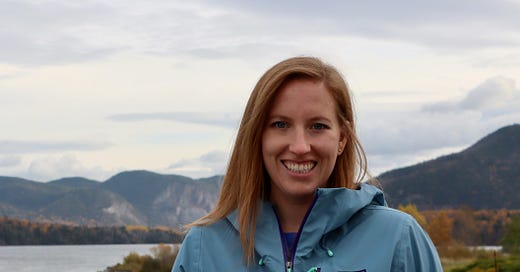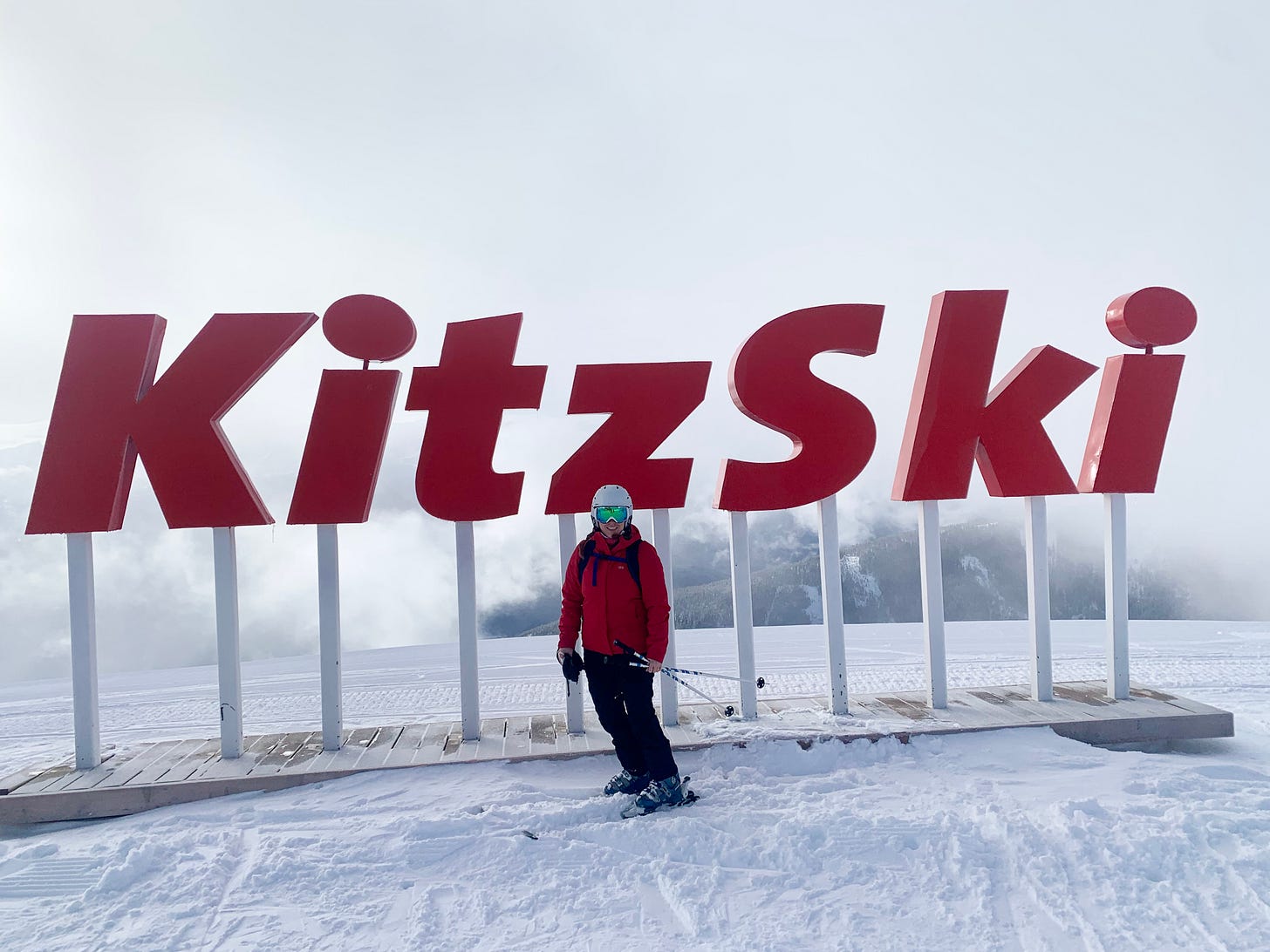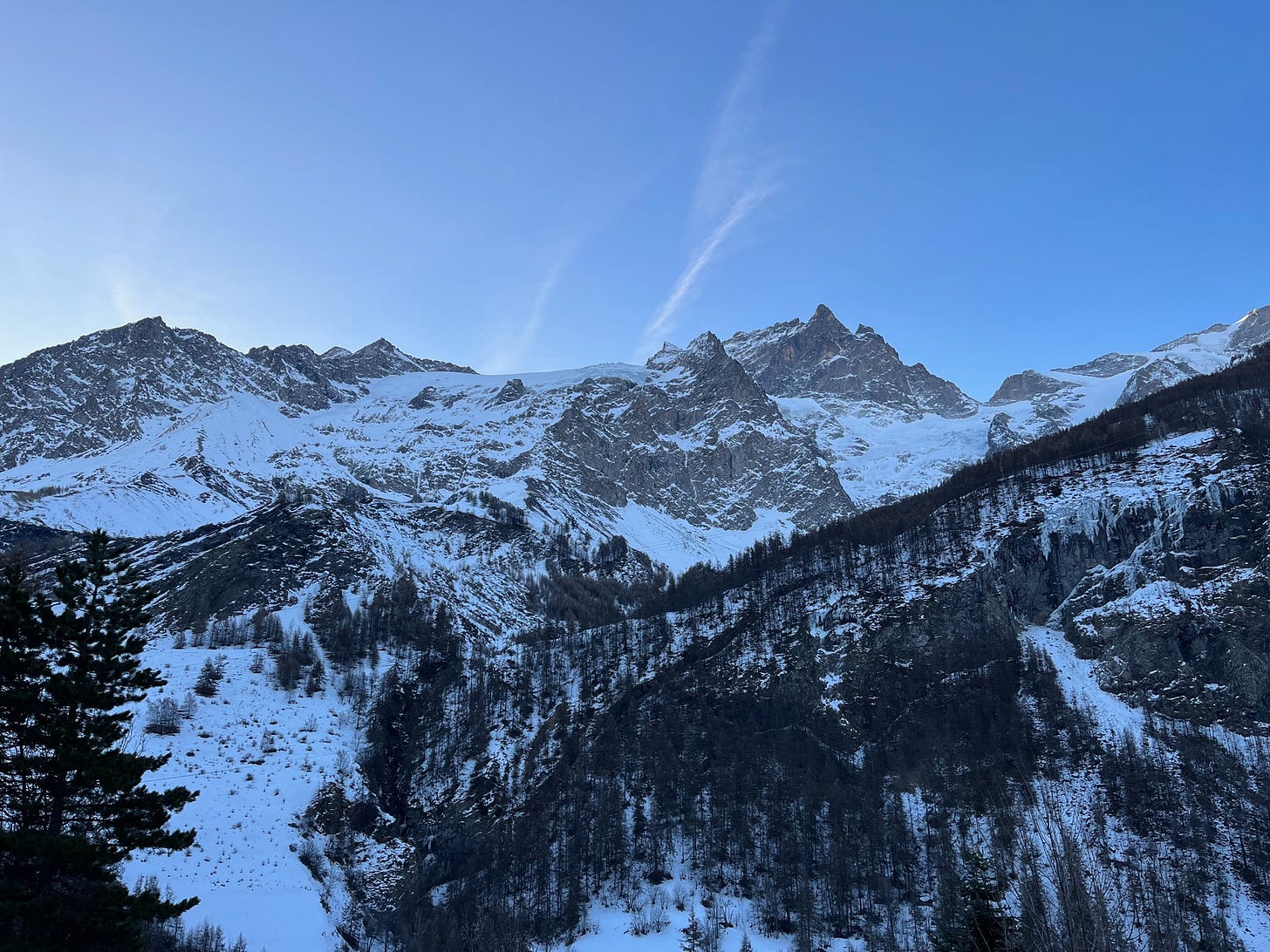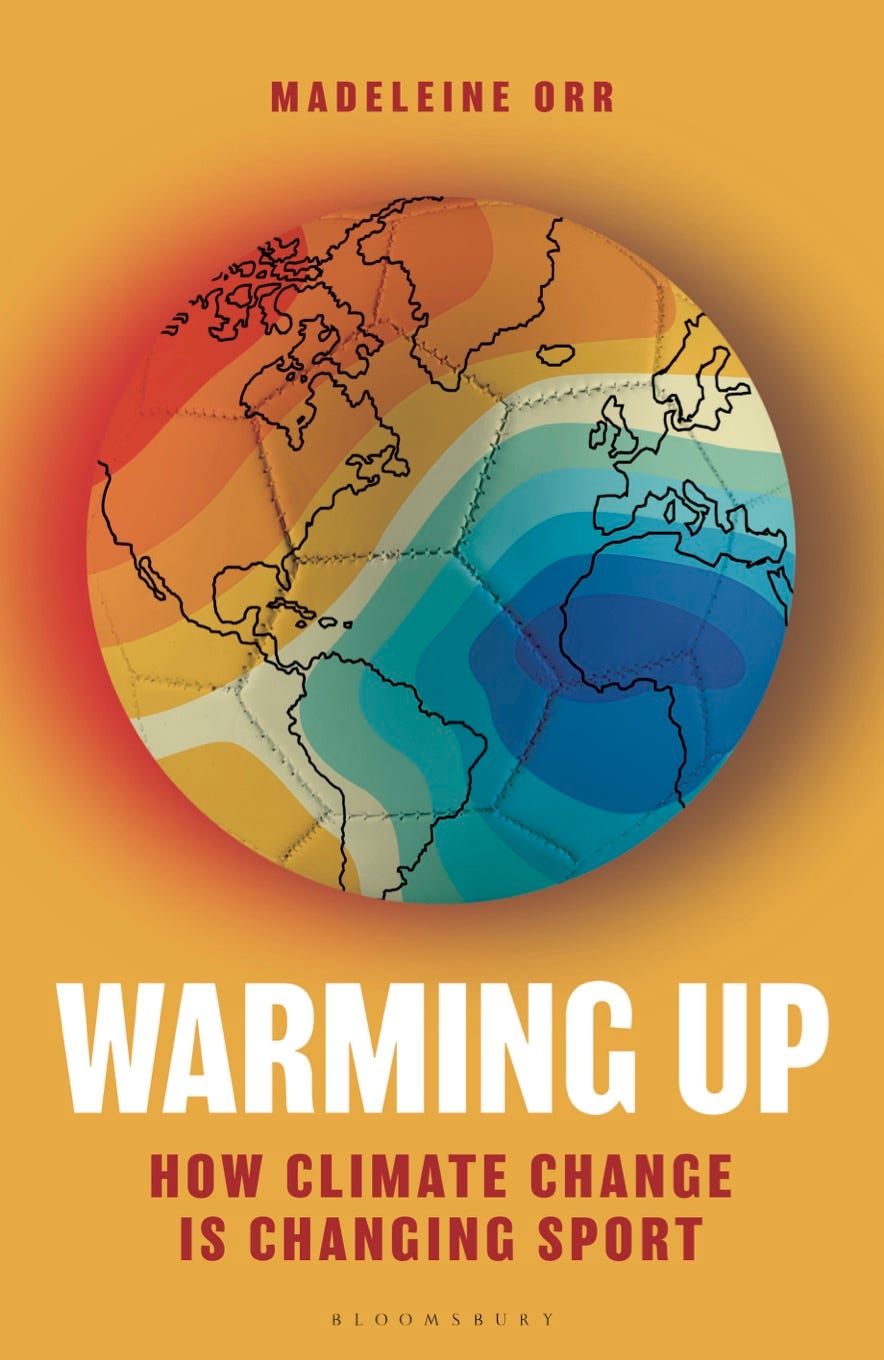“Keeping skiing would be awesome but that’s not my endgame”
An interview with Dr Maddy Orr, skier, academic and environmental advocate from Toronto, Canada
“If we can affect change in sport – and keeping skiing would be awesome – that’s great, but that’s not my endgame. The idea is to use sport as a spoonful of sugar to have these conversations about climate change, something that people would otherwise ignore because it seems like someone else’s problem or far away in the future.”
I was first aware of Maddy’s research when she wrote this super interesting/scary piece on how future heatwaves would affect the Tour de France and I’ve followed her work ever since. She looks at the impacts of climate change on sport – many of the themes I get into in the newsletter – albeit with a lot more academic rigour and research!
Her book, Warming Up: How Climate Change is Changing Sport, is coming out in May and I can’t wait to read it. In this interview, we talk about how a love of skiing set her on this path, the future of the Winter Olympics, shifting surf breaks and how to speak up without being a doom merchant. I hope you enjoy this chat as much as I did.
Hey Maddy, when did you first become interested in studying sport and climate change?
I’ve always loved to ski, I grew up spending weekends in the mountains here in eastern Canada, and then after studying in the UK, and doing my masters in Brighton, I went to Serre Chevalier in the Alps to be a ski bum.
It was 2015/16, and as I’d just come out of grad school, they put me straight into a management role which was awesome as I got to ski the whole region. I loved it, except that we didn’t get any snow, so it was all artificial snow at the start of the season.
Then we got a huge dump of snow in January which landed on frozen ground, and it was sliding everywhere – there were multiple avalanches. Five kids and their instructor and two teenage Czech skiers died within a few days, and it hit hard, everyone’s morale was pretty blown apart.
For me it was a bit of a wakeup call because we should have had a lot more snow on the ground earlier, and it took me a day or so to connect it to climate change, though people weren’t talking about it much in the Alps back then. When I wrote my entrance essays for my PhD, I said: “The mountains are falling apart, and I want to study this!”
If we can affect change in sport – and keeping skiing would be awesome – that’s great, but that’s not my endgame. The idea is to use sport as a spoonful of sugar to have these conversations about climate change, something that people would otherwise ignore because it seems like someone else’s problem or far away in the future.
And once people are thinking about these issues, what should happen next?
The best thing the average person can do about climate change is talk about it. It’s this big scary thing, and it is literally life or death for some people which is really hard, but I don’t think every conversation about climate change has to be talking about those life or death stakes for it to matter.
How do you do that without being the preachy friend?
I’m not the right person to answer that as I am the preachy friend haha.
But you can keep it light and bring humour into it, it doesn’t have to be like the world is ending. It can be more: “Ooh it’s hot outside, it’s not supposed to be that hot outside.” That’s your climate comment for the day and that’s ok.
How about when there’s an election?
I would say vote in the local elections, not just the national ones. The biggest things that will happen on climate change are going to happen locally, such as how your waste gets managed, and what public transport options exist.
Don’t be afraid to talk about it. People freak out about climate change because it’s always framed as what we have to give up and lose but that’s not really fair, we stand to gain so much from getting this right. The assumption that everything is based on loss assumes that everything about our lives is perfect and that’s not true.
When we get this right, we get cleaner air and that will reduce 10,000 deaths a year in the UK, that’s an NHS win for everybody, and our sports teams will perform better because they are competing in healthier conditions, and we’ll have nicer places to walk and play outside in our communities. As soon as you start talking about this to people it becomes easier for people to say: “Oh yeah, I do want to be more rested and better fed and breathe better air, that would be great.”
How do you see the future of the Winter Olympics?
I think it will continue to exist, but I don’t think it will look how it looks now. The IOC is entertaining a few different models – one of them would be a circuit of four or five cities where the games would rotate between them. It’s not perfect as obviously it cuts off entire communities from the potential of hosting and being inspired but I think it preserves it for the long term.
The Olympics are stupidly expensive to host. They come to places, you build all these facilities and then leave and what happens? Right now, Milan-Cortina is facing huge issues around building a bobsleigh track [Luca Albrisi is one of many opposing it].
[With the new model], there would be a certain number of facilities that we could go to over and over, they might need a few upgrades, but in theory most of those jobs would stay as they’d also host world cup and world championship events in between. The hubs would have to be at high altitude on mountains that have a solid north face though.
Beyond these ski hubs, how will skiing look for the rest of the resorts?
I don’t think it’s good. I think we will lose quite a few resorts; we lost one last year in France, because of the crunch of shorter seasons. Snowmaking works as a stopgap when there isn’t enough precipitation but it’s not a solution to heat, you can blow something out of a gun all you like but if it melts when it hits the ground you’ve got nothing.
And water polling rights are getting increasingly challenging in many parts of the mountains. I think diversification is going to help, but I also think we’re going to see a drain out of some of those towns.
It’s hard, especially as some places are more impacted than others…
That’s the cruel logic of climate change. California is notoriously dry, to get a lot of precipitation all at once in any season is not what you would expect and yet they’ve gotten a lot of crazy seasons and they’ve had a lot of avalanche deaths this year, because we’re not used to the extremes, and nor should we be, that’s why they’re called extremes.
I do feel it on an emotional level. I was skiing recently in Quebec, in places I have always known to be completely white at this time of year and it was green.
What about the plans to build a ski resort in Saudi Arabia. It all seems a bit tone deaf to me. Should teams be boycotting future contests there?
I would hope so, but I don’t know if they will. Also, when we’re having a conversation about huge human rights allegations and abuses, what are we doing?
I think it’s a bit of a last ditch effort by the Gulf states to mirror the west but actually the west is moving away from that.
What other sports do you look at in your book?
I talk about surfing and how coastal erosion is changing that quite a lot in terms of how waves break, for example in Narrabeen in Sydney. And then you have the destruction of coral reefs, there’s the raft tower at the Olympics in Tahiti but also oil wells dug into places where there is coral and the effects of warmer oceans.
We’re also seeing more big game fish coming closer to shore because the oceans are warmer which is affecting people’s sense of safety in the water. And floods or heavy rain pulling all kinds of crap into the water, especially in the UK. You’re meant to wait 72 hours after a big rain before you surf but how many people do?
What do you think the role of athletes as climate activists should be?
I’ve done the research on athlete activism, and it’s not necessarily the case that being a person who plays in the outdoors actually correlates to giving a damn about the outdoors [as Dr Rebecca Olive also told me]. We’ve all heard that narrative so much. “I love surfing so much and I love the ocean…” but are you willing to make changes to protect that ocean, and are you willing to speak up for the ocean?
But I don’t actually think our individual behaviours matter that much. If you use a plastic straw one time because you forgot to tell the bar person, whatever, it’s not about that but on the whole are you generally trying? The big thing that keeps getting sold to us is the idea that consumption is the most important thing we can do. I’m a citizen before I’m a consumer [Gavin Fernie-Jones spoke about this in the last newsletter] and I would hope everyone would think that way and not be sold this idea of vote with your wallet. That’s one way but not the only way.
Big sports organisations presumably have quite a good lobbying position with governments on this?
100%, but it’s tricky as there are very few sports organisations who are ready to get into the political conversations at the moment. They are all making big strides and working on climate resilience as they know it’s a problem, but the challenge remains how we talk about it, and use that power to leverage a bigger change on a higher level. That’s where we haven’t quite seen it, although I will point to Aspen Skiing Company as a standout [here’s an interview I did with Auden Schendler, SVP of Sustainability at Aspen Ski Company].
To order Maddy’s book head here and to find out more about her work head here.
Other news:
For Guardian Travel, I wrote about the importance of places like La Grave in the French Alps, as snow gets less reliable, and skiing becomes ever more expensive, and whether a new lift will help or hinder that. [Big thanks to my good pal Vanessa Beucher for showing me around and providing crucial background on this story. Also, I didn’t write the headline…]
On the topic of ski lift controversy, I enjoyed this thought-provoking discussion between my last newsletter guest Gavin Fernie-Jones and my good friend Chris Moran on the plans for a lift at Bozel on
.This New York Times piece on last-chance tourism and Chamonix’s glaciers is a good one.
This story about a ski tunnel in Sweden, designed to allow cross country skiers to keep skiing in a warming world, feels pretty dystopian to me.
I feel like I haven’t done a Protect Our Winters shout out in a while, but they do really do crazy important work in this space. Get involved here
And finally, I was interviewed for Caroline Keylock’s excellent new podcast, Board Woman, recently. We talked about the heady days of Cooler Magazine, surfing as a lifelong journey, how each day on the mountain is a privilege & why I have no truck with people dissing middle-aged cold water swimmers. Have a listen here, I’m ep 10.
As ever, please fwd this newsletter to anyone who you think might be interested & if you have any story tips on any of these themes pls get in touch.






